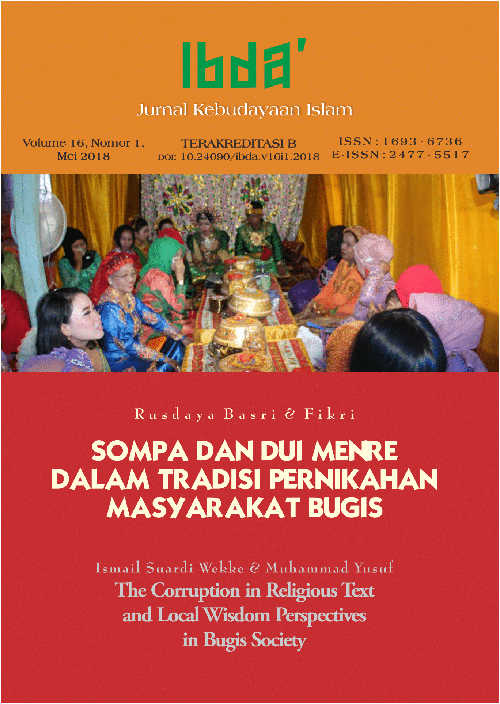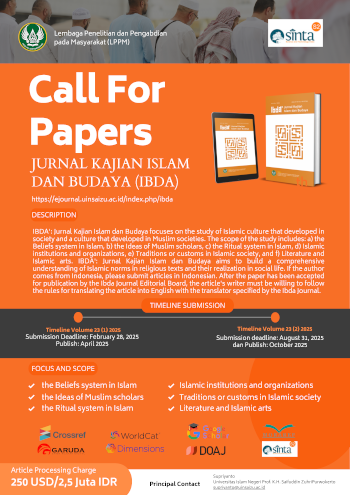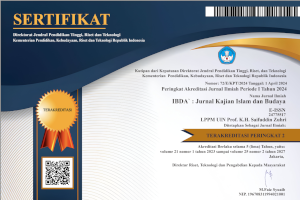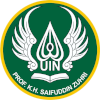The Corruption in Religious Text and Local Wisdom Perspectives in Bugis Society
DOI:
https://doi.org/10.24090/ibda.v16i1.1387Keywords:
Corruption, Qur’an, local wisdom, nafsun, preventionAbstract
Corruption is a detrimental and harmful crime that is done individually or collectively. Therefore, corruption must be prevented and overcome. To prevent the corruption, firstly, the factors that lead the corruption should be eradicated; then, the prevention actions are formulated. This article aims to elaborate the guidance from the Qur’an and the local wisdom from Bugis society investigating the causes of corruption and how the Qur’an offers the prevention action of the corruption. To understand the guidance in the Qur’an and to prevent the corruption, this study was conducted through the Arabic linguistic approach. In addition, the researchers integrated the guidance in the Qur’an with the local wisdom values derived from the Bugis culture relevant to the prevention of corruption. This study shows that the Qur’an commences the prevention of corruption in two ways: the first, it is done through total structural reform; and the second, the analysis is started from the ‘inner side’ of humans based on the concept of nafsun stated in the Qur’an. Culturally, preventing the corruption should always refer to the principles of lempu’, amaccang, agettengeng, asitinajang, reso, and siri’ . Those values should be reinforced and embodied (instilled) in life. In short, the values of local wisdom are needed to be reintroduced and taught, especially to the younger generation before they become leaders in the future.Downloads
Download data is not yet available.
References
Al-Maliki, M. S. (1505). Hasyiah as-Showi ’Ala Tafsir Al-Jalalain.
Al-Maraghi, A. M. (1984). Tafsir Al-Maraghi . Semarang: Toha Putra.
Alwi, H. (2005). Kamus Besar Bahasa Indonesia (3rd ed.). Jakarta: Balai Pustaka.
Al-Zarkasyi, B. al-D. (1975). Al-Burhan fi ’Ulum al-Qur an (1st ed.). Kairo: al-Halabi.
Al-Zarqani. (1988). Manahil al-’Irfan fi ‘Ulum al-Qur’an . Bairut: Dar al-Fikr.
Asy-Syarqawi, A.-S. A. (2016). Syarh al-Hikam Ibnu Atha’illah as-Sakandari. Jakarta: Wali Pustaka.
Bakti, A. F. (2009). Kita Harus Menghormati Local Value , Khazanah Islam Nusantara: Rekam Jejak Dialektika Islam dan Local Value. Jurnal Bimas Islam, 2 (1), 30.
Besley, A. C. (2013). Philosophy, Education and the Corruption of Youth From Socrates to Islamic Extremists Educational Philosophy and Theory, v45 n1 p6-19
Dneprov, S. À. & Nikoriak, V. V. (2014). “Actual social experience of participation of future jurists in the corruption relationsâ€. Education and The Law, 3, 7–16.
Galtung, F. et al. (Ed.). (2013). Measuring Corruption . Surrey: Ashgate Publishing, Ltd., 105-128
Guerber, A., Rajagoplan, A., & Anand, V. (2016). The Influence of National Culture on the Rationalization of Corruption . Crime and Corruption in Organizations: Why It Occurs and What to Do About It , 143 p.
Johnston, M. (2014). Corruption, contention and reform: the power of deep democratization . New York: Cambridge University Press.
Mursalim. (2008). Tafsir Bahasa Bugis/Tafsir al-Qur’an al-Karim Karya Majelis Ulama Indonesia (MUI) Sulawesi Selatan; Kajian terhadap Pemikiran-Pemikirannya . UIN Syarif Hidayatullah.
Rahim, A. R. (2011). Nilai-Nilai Utama Kebudayaan Bugis . Yogyakarta: Ombak.
Rose-Ackerman, S., & Palifka, B.J. (2016). Corruption and Government: Causes, Consequences, and Reform . Cambridge: Cambridge university press, 266 p.
Shihab, Q. M. (1997). Pendidikan Nilai untuk Pembentukan Sikap dan Prilaku . Jurnal Pendidikan.
Syuzeva, N. V. (2015). From the anti-corruption subculture to not corruption culture . Culture and civilization , 6, 189–204.
Wekke, I. S. (2015). Tradisi Pesantren dalam Konstruksi Kurikulum Bahasa Arab di Lembaga Pendidikan Minoritas Muslim Papua Barat . KARSA: Jurnal Sosial dan Budaya Keislaman, 22(1), 20–38.
Wekke, I. S., & Lubis, M. A. (2008). “A Multicultural Approach in Arabic Language Teaching: Creating Equality at Indonesian Pesantren Classroom Lifeâ€. Sosiohumanika , 1(2), 295–310.
Wekke, I. S., & Sari, Y. R. (2014). “Tifa Syawat dan Entitas Dakwah dalam Budaya Islam: Studi Suku Kokoda Sorong Papua Barat†. Thaqafiyyat : Jurnal Bahasa, Peradaban dan Informasi Islam, 13(1), 163–186.
Zuhailiy, W. (n.d.). Tafsir al-Munir fi Al-Aqidati Wa Al- Syariati Wa Al-Manhaj . Damsyik: Dar al-Fikr.
Al-Maraghi, A. M. (1984). Tafsir Al-Maraghi . Semarang: Toha Putra.
Alwi, H. (2005). Kamus Besar Bahasa Indonesia (3rd ed.). Jakarta: Balai Pustaka.
Al-Zarkasyi, B. al-D. (1975). Al-Burhan fi ’Ulum al-Qur an (1st ed.). Kairo: al-Halabi.
Al-Zarqani. (1988). Manahil al-’Irfan fi ‘Ulum al-Qur’an . Bairut: Dar al-Fikr.
Asy-Syarqawi, A.-S. A. (2016). Syarh al-Hikam Ibnu Atha’illah as-Sakandari. Jakarta: Wali Pustaka.
Bakti, A. F. (2009). Kita Harus Menghormati Local Value , Khazanah Islam Nusantara: Rekam Jejak Dialektika Islam dan Local Value. Jurnal Bimas Islam, 2 (1), 30.
Besley, A. C. (2013). Philosophy, Education and the Corruption of Youth From Socrates to Islamic Extremists Educational Philosophy and Theory, v45 n1 p6-19
Dneprov, S. À. & Nikoriak, V. V. (2014). “Actual social experience of participation of future jurists in the corruption relationsâ€. Education and The Law, 3, 7–16.
Galtung, F. et al. (Ed.). (2013). Measuring Corruption . Surrey: Ashgate Publishing, Ltd., 105-128
Guerber, A., Rajagoplan, A., & Anand, V. (2016). The Influence of National Culture on the Rationalization of Corruption . Crime and Corruption in Organizations: Why It Occurs and What to Do About It , 143 p.
Johnston, M. (2014). Corruption, contention and reform: the power of deep democratization . New York: Cambridge University Press.
Mursalim. (2008). Tafsir Bahasa Bugis/Tafsir al-Qur’an al-Karim Karya Majelis Ulama Indonesia (MUI) Sulawesi Selatan; Kajian terhadap Pemikiran-Pemikirannya . UIN Syarif Hidayatullah.
Rahim, A. R. (2011). Nilai-Nilai Utama Kebudayaan Bugis . Yogyakarta: Ombak.
Rose-Ackerman, S., & Palifka, B.J. (2016). Corruption and Government: Causes, Consequences, and Reform . Cambridge: Cambridge university press, 266 p.
Shihab, Q. M. (1997). Pendidikan Nilai untuk Pembentukan Sikap dan Prilaku . Jurnal Pendidikan.
Syuzeva, N. V. (2015). From the anti-corruption subculture to not corruption culture . Culture and civilization , 6, 189–204.
Wekke, I. S. (2015). Tradisi Pesantren dalam Konstruksi Kurikulum Bahasa Arab di Lembaga Pendidikan Minoritas Muslim Papua Barat . KARSA: Jurnal Sosial dan Budaya Keislaman, 22(1), 20–38.
Wekke, I. S., & Lubis, M. A. (2008). “A Multicultural Approach in Arabic Language Teaching: Creating Equality at Indonesian Pesantren Classroom Lifeâ€. Sosiohumanika , 1(2), 295–310.
Wekke, I. S., & Sari, Y. R. (2014). “Tifa Syawat dan Entitas Dakwah dalam Budaya Islam: Studi Suku Kokoda Sorong Papua Barat†. Thaqafiyyat : Jurnal Bahasa, Peradaban dan Informasi Islam, 13(1), 163–186.
Zuhailiy, W. (n.d.). Tafsir al-Munir fi Al-Aqidati Wa Al- Syariati Wa Al-Manhaj . Damsyik: Dar al-Fikr.

Downloads
Published
2018-05-10
How to Cite
Wekke, I. S., & Yusuf, M. (2018). The Corruption in Religious Text and Local Wisdom Perspectives in Bugis Society. IBDA` : Jurnal Kajian Islam Dan Budaya, 16(1). https://doi.org/10.24090/ibda.v16i1.1387
Issue
Section
Articles
License
Authors who publish with this journal agree to the following terms:
- Authors retain copyright and grant the journal right of first publication with the work simultaneously licensed under a Creative Commons Attribution-ShareAlike License a that allows others to share the work with an acknowledgement of the work's authorship and initial publication in this journal.
- Authors are able to enter into separate, additional contractual arrangements for the non-exclusive distribution of the journal's published version of the work (e.g., post it to an institutional repository or publish it in a book), with an acknowledgment of its initial publication in this journal.
- Authors are permitted and encouraged to post their work online (e.g., in institutional repositories or on their website) before and during the submission process, as it can lead to productive exchanges, as well as earlier and greater citation of published work (See The Effect of Open Access).















